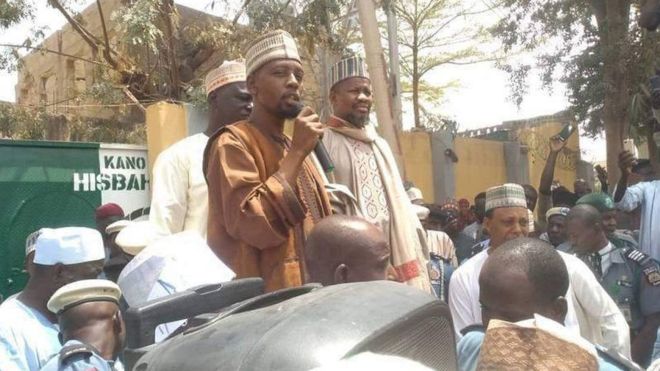
Nigerian boy, 13, jailed for blaspheming God
An Islamic court in northern Nigeria's Kano state has sentenced a 13-year-old boy to 10 years in prison for blasphemy.
Th child was accused of making uncomplimentary remarks about God.
In a separate case before the court, 22-year-old musician Yahaya Sharif-Aminu was sentenced to death by hanging after being found guilty of making derogatory remarks about Prophet Muhammad in a song.
A spokesman for the court, Baba Jibo Ibrahim, told the BBC the boy and singer have the right to appeal against the sentences within 30 days.
Kano is one of several states in the mainly-Muslim north that practise the Islamic legal system alongside the country’s secular laws.
'Judgement will serve as deterrent to others'
The leader of the protesters that called for the musician's arrest in March, Idris Ibrahim, told the BBC that the judgement will serve as a warning to others "contemplating toeing Yahaya's path"."When I heard about the judgment I was so happy because it showed our protest wasn't in vain.
"This [judgement] will serve as a deterrent to others who feel they could insult our religion or prophet and go scot-free," he said.
Who is Yahaya Sharif-Aminu?
Few people had heard of him before his arrest in March.
An Islamic gospel musician, he is not well-known in northern Nigeria and his songs were not popular outside his Tjjaniya sect, who have many such musicians within their ranks.
How common are death sentences in Sharia courts?
Several sentences have been passed, including for women convicted of having extramarital sex - cases which have caused widespread condemnation.
But only one has been carried out - a man convicted of killing a woman and her two children who was hanged in 2002.
The last time a Nigerian Sharia court passed a death sentence was in 2016 when Abdulazeez Inyass, was sentenced to death for blaspheming against Islam during after a secret trial in Kano.
He was alleged to have said that Sheikh Ibrahim Niasse, the Senegalese founder of the Tijaniya sect, which has a large following across West Africa, "was bigger than Prophet Muhammad".
The sentence has not been carried out as a death penalty in Nigeria requires the sign-off of the state governor.
Mr Inyass is still in detention.
How Nigeria's Sharia courts work
Twelve states in Nigeria's Muslim-dominated north operate the Sharia system of justice, but only Muslims can be tried in its courts.
The Sharia system, which also has its own Court of Appeal, handles both civil and criminal matters involving Muslims and its judgements can also be challenged in Nigeria's secular Courts of Appeal and the Supreme Court.
The Sharia judges, known as alkalis, are learned in both Islamic and secular laws.
If a case involves a Muslim and a non-Muslim, the non-Muslim has the option of choosing where they want the case to be tried. The Sharia court can only hear the case if the non-Muslim gives written consent.
Sentences handed down by the courts include floggings, amputations and the death penalty.
